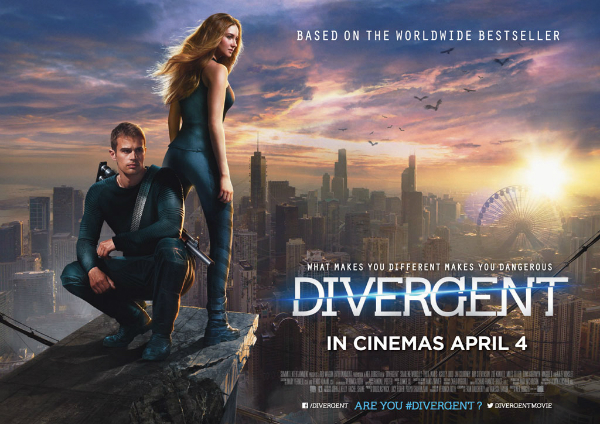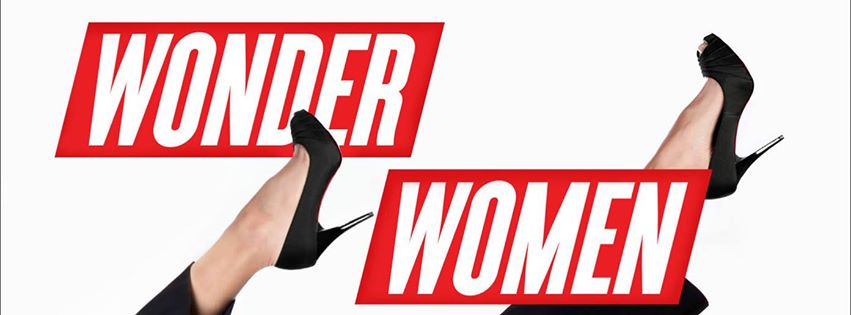
Written by Amanda Rodriguez
Mild Spoilers
Trigger Warning: mention of sexualized violence
The much-anticipated film Divergent is based on the series of teen sci-fi novels by Veronica Roth dealing with a walled-off, post-apocalyptic Chicago wherein society has divided itself into factions in an effort to create order and peace. Our heroine Beatrice “Tris” Prior (Shailene Woodley) finds out she is “Divergent,” a taboo non-conformist who doesn’t fit into any of the factions and is therefore threatening to the caste system.

Disclaimer: I haven’t read the novel series yet.
As a sucker for female-driven sci-fi stories, I liked the premise, but Divergent stands on the shoulders of many young adult and teen movies that came before it. Divergent features training-based dream-like hallucinations like in Ender’s Game.

Tris is another thin, white heroine who learns she is more capable than she ever suspected, much like Katniss from The Hunger Games or Clary from The Mortal Instruments: City of Ashes series.

Divergent‘s Choosing Ceremony has young people choose which faction they’ll belong to for the rest of their lives (“faction before blood”). With factions like Abnegation, Erudite, and Dauntless, the Choosing Ceremony hugely resembles the Sorting Ceremony from the Harry Potter series, wherein wizarding youths are sorted into houses like Gryffindor, Hufflepuff, and Ravenclaw (representing bravery, hard work, and intelligence respectively).

Divergent also spotlights the obligatory overwrought teen romance replete with multiple manly rescues of our heroine in a way that bears a strong resemblance to Twilight (though Tris admittedly has more fortitude and independence than her counterpart, Bella).

Divergents themselves are essentially misfits with special abilities that speak to the potential of human beings for evolution into a more advanced species like in the famed comic book turned cartoon series turned movie franchise X-Men.

Lastly, I think we should expect the second film (Insurgent) to really play up the youth rebellion angle like in The Legend of Billie Jean.

So, yes, Divergent is derivative and predicable. Funny how a movie with an emphasis on the importance of being different…isn’t all that different itself. I was, however, still entertained, and I’m willing to wait and see if the second two films pave their own way, uniquely establishing themselves within the lexicon of the iconic pop culture fantasy/sci-fi teen series genre.
Divergent is basically an unnecessary prequel. I’m a fan of training sequences and didn’t tire of them despite the fact that Tris repeatedly gets her ass handed to her.

However, almost an entire film dedicated to Tris’ martial training, her budding romance, and the requirements of survival within the faction of Dauntless are not strictly necessary for the big picture scope of the series. I suspect the real story starts in the next movie, Insurgent, with the caste system in upheaval and Tris coming into her own as a leader of dissidents.
I was disappointed at the under-utilization of Kate Winslet‘s extensive acting powers in her role as the Erudite leader and villainess Jeanine. I’m frankly so tired of the cold, fanatic female villain trope. Jodie Foster played a similarly uninspired role in the sci-fi film Elysium. At first, I hoped that Jeanine would only be Tris’ first foe, the patriarchy-complicit woman, and that Tris would advance beyond that to actually deconstructing the patriarchal system of oppression in the following films. A quick Wiki search disabused me of that notion.

No, it looks like our lead villain throughout the series will be Jeanine, which makes me question the underlying thematics behind the class structure that the film and book series critique. Is it claiming that cold, intelligent women are the problem? Are they the purveyors of this dysfunctional culture? If so, for which real world social ill is the post-apocalyptic world of Divergent a stand-in? What problematic mechanism of power does this sci-fi series seek to illuminate? So far, all we’ve got is a generic argument that being different and thinking differently is a good thing. Not much subversiveness going on there.
Tris also gets rescued a lot, mostly by her love interest, Four, played by Theo James (James Franco called…he wants his face back). This made me roll my eyes a lot because I didn’t pay $10 to watch a young woman lead be so dependent on a dude for her survival. Not only that, but through a fear simulation, we learn that one of Tris’ greatest fears is that Four will try to rape her, and that theme isn’t delved into at all. However, I did admire the close, loving relationship Tris shares with her mother (Ashley Judd) and that her mom also rescues her in a surprising act that would make both factions Abnegation and Dauntless proud.

As with so many other aspects of the film, I’m letting our heroine’s constant need to be rescued slide because I’m hopeful that Divergent, as the first installment of the series, is setting Tris up to be a memorable heroine in her own right in the following films. I’m hoping that Divergent is the story of the forging of our heroine, the exploration of her talents, abilities, and heart and that the second and third films will show her learning from her experiences, becoming a leader, and inspiring others. At the end of Divergent, we saw a glimmer of her potential in her rallying of others, quick thinking in a crisis, her empathy, self-sacrifice, inventiveness, and the steel in her spine.

The bottom line is that, despite Divergent‘s glaring flaws, I am so inspired by this outpouring of stories written by and about women. The mathematical expression of the term divergent is, simply put, “having no finite limits.” Right now, Tris’ story is empowering young girls and women with her bravery, her vulnerability, and her centrality. We have so desperately needed greater representation for young women so that they can imagine themselves in the roles of heroines, leaders, and catalysts for change. It is an important step forward that these films are being made at all. It is a coup that they are so damned popular, proving that people, in fact, DO want to see stories about women and that those stories DO sell. Eat your heart out Hollywood.



